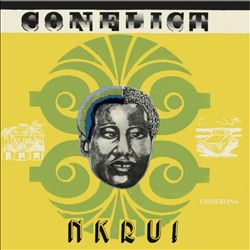Highlife songwriter, musician and producer Ebo Taylor returned to stake his claim as one of Africa’s best kept musical secrets with his Love And Death album in 2009. Last year’s Appia Kwa Bridge continued his resurgence, with a focused set in which Taylor, now in his mid-70s, displayed a fine compositional skill developed over a lifetime. In the 1970s Ebo Taylor became one of Ghana’s most prominent arrangers, working with the Apagya Show Band and musicians including C.K. Mann and Pat Thomas. To capitalise on the revived interest in Taylor, Mr Bongo have reissued two long out of print classic recordings that capture the artist in his prime in the late 1970s and early 80s; his self-titled 1977 album and also 1980’s Conflict Nkru! with Uhuru Yenzu.
While Ebo Taylor is mostly sung in Ghanian, Conflict Nkru! is in English, so had potential to reach a wider audience. The jazzy upbeat songs sound sweet but carry deep messages of faith, love, death and redemption. ‘You Need Love’ may be an upbeat opener, suggesting “Come and hold me now, I can make you feel,” but on follow up ‘Love And Death’ the subject matter gets darker. Built on the swinging horn section’s foundation, funk guitars and wandering bass, as the lead female vocalist sings “Love and death, go hand in hand, the way to the grave is just the same”.
The songs provide a great example of Taylor’s Afro-funk, woven with tight guitar licks. Flute enters the mix on third track, on the stop-and-start intro of ‘What Is Life?,’ as vocals cry “War or peace, what is life?” By ‘Christ Will Come’ the tone has gone from soul searching existentialism to an apocalyptic vision of judgement day. Haunting flute lines again lead the track, as Taylor, this time taking over on lead vocals, sings “When he comes you will sit on the right side of God, on the judgement day” over a deep percussive groove lead by a trio of drums, conga and African drums, backed by a mass choir of chanted voices. Closer of the five long tracks ‘Victory’ is based on the stories of the Asafa (war people), calling in support of those “Great brothers, they have sacrificed their blood, for the unity of all nations, for the unity of all mankind”. The song keeps alive ancient storytelling traditions, relating personal tales about the plight of the Fante people, themes that Taylor has continued to explore on his recent albums, although these recordings have featured more of a blues influence.
The tribal artwork on Conflict Nkru! presents a traditional image of the musician slightly at odds with the flares-wearing Taylor shown on the cover of his 1977 album. Those seeking the authentic 70s recordings will be satisfied with the sound quality on Ebo Taylor: the songs remain timeless. While opener ‘Saana’, with its English lyrics, may be aimed at an international audience, the rest is largely sung in Ghanian. The record also features Taylor’s take on Afrobeat, ‘Heaven’ being one of the classics of the genre, locked into a tight propulsive rhythm inspired by the work of Nigerian Fela Kuti, whom Taylor studied music alongside in London earlier in the early 1960s. Both were clearly influenced by a wide range of sounds; not just traditional music from their homeland, but also popular styles from America and rhythms from South America – soul, jazz and funk all play a key role in the mix.
Of the two albums, Conflict Nkru! is rawer in comparison to the smooth self-titled album and one suspects there may be more forgotten gems to be unearthed from this rare talent, whose vast 60s and 70s output, which aside from odd tracks on compilations, remains largely unavailable.


